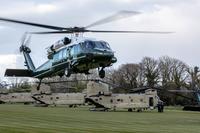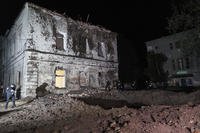KYIV, Ukraine — In a modest gym in the heart of Kyiv, boxer Anna Lysenko dedicates long hours preparing for next year's Paris Olympics despite the unsettling sounds of explosions booming outside.
Lysenko already has Olympic experience, nearly winning a medal at the Tokyo Games in 2021, but her training routine this time has been disrupted by the war in Ukraine — that started nearly 17 months ago when Russia invaded her country.
In a well-lit, spacious gym with high windows, she often hears bombs exploding outside as the capital remains a target for the Russian army.
“It’s stifling. It probably doesn’t allow me to feel at peace, to train and prepare in a measured way,” Lysenko said, wearing an orange sports jacket with “Tokyo 2020" on the back, reminiscent of a calmer training routine.
“Constant shelling, or other stresses associated with the situation in the country, always seem to be present.”
Despite these challenges, the 31-year-old Lysenko refuses to give up on her training. She has already sacrificed almost 10 years of her life for the sport, reaching the quarterfinals in Tokyo but missing out on an Olympic medal after losing to the eventual gold medalist. Knowing the Paris Games may be her last, she perseveres, training six days a week hoping to get better, to get faster, to win.
Her chances of competing in Paris, however, remain uncertain.
Ukrainian athletes have in recent weeks missed world or European championship events in judo, fencing and taekwondo, where Russians and Belarusians were allowed to compete after being approved as neutral athletes.
Last week, International Olympic Committee president Thomas Bach criticized the Ukrainian government for blocking some athletes from qualifying events for the 2024 Games that also included Russians and Belarusians.
Ukrainian President Volodymyr Zelenskyy has said any neutral flag is stained with blood and invited Bach in January to join him in visiting the wrecked city of Bakhmut.
The IOC and Bach shaped the definition of neutrality in March — not publicly supporting the war, nor being contracted to the military since February last year, competing without a flag, anthem or national colors — that sports governing bodies must decide how or if to apply.
“This is very bad,” Lysenko said about the neutral flag for Russians and Belarusians.
As a Ukrainian athlete, she finds it “very unpleasant” that citizens of Russia will have the opportunity to participate in the Olympics. Despite the neutral flag, she said, the athletes “are citizens of their own country, they represent it.”
The IOC took a tough position on Russia within days of the war starting, urging sports bodies to exclude athletes and officials from international events and strip the country of hosting rights.
However, as the Paris Olympics approached, the IOC moved toward letting some Russians into competition and Bach said excluding athletes based just on their passport would be discrimination and a breach of their human rights.
For Lysenko, such a decision by the IOC means that Ukrainian athletes have to compete in an “unequal battle” with citizens of a country that started a war in her homeland.
“Because there, athletes can train in peace, nobody is shelling them, they don’t lose their loved ones, acquaintances, friends. They don’t lose them in the war,” she said.
“For every professional athlete, the Olympics are the pinnacle of their sporting journey,” Lysenko added. “As an athlete, I can understand that. But as a person ... When you witness the sorrow of your loved ones, it’s very difficult to accept.”
She recalls how last autumn, on the day when she and her team were supposed to leave for the European Championships in Montenegro, Russia launched one of many missile attacks at Kyiv. At that moment, Lysenko was at the Olympic base near the capital.
“And there you could really hear those explosions, there was such a shaking there, and we had to leave in literally two or three hours that day,” she recalled. “How to leave your family in such a condition, when something like that is happening … It’s stressful.”
Even when she is abroad for competitions, her thoughts are still anchored to events in Ukraine.
During the most difficult periods, Lysenko didn't stop training. During the winter, when Russia was bombarding Kyiv and the rest of the country with dozens of rockets almost every week to destroy the energy infrastructure, Lysenko continued to train even without electricity.
“It was very challenging,” she said. “We were starting to train a bit earlier to have some light from outside.”
The decision of the Ukrainian Olympic Committee to boycott qualifying competitions involving Russians and Belarusians evokes conflicting emotions for Lysenko.
“If they are already banning everyone and saying it’s a boycott, then it should apply to everyone,” she said, explaining that, for example, Ukrainian tennis players continue to participate in competitions with Russians and Belarusians.
Under the circumstances that have arisen, Lysenko chooses to compete and fight.
“We have our own sports frontline, and we need to go out there and win,” she said, adding “it would be very disappointing” if she doesn’t go to the Olympics.
“A lot of effort has already been put in to have it end like this, not being able to bring a medal for my country and once again represent our country to the whole Olympic world,” Lysenko said.
For her, the Paris Games could be her last chance to compete at the Olympics. She will be 36 by the time the Los Angeles Games open in 2028.
“I can still continue training, but I have my own plans on how to lead my life and develop in other areas," Lysenko said. "Not just in sports.”
For now, she continues her training, even in periods when Kyiv is being attacked almost nightly by the Russians.
“A person gets used to everything,” she said, noting her challenges pale in comparison to what Ukrainian soldiers endure.
“When you think about how hard it is there, you realize that everything is great for you,” Lysenko said. “And we will keep working here because they are doing everything there to allow us to do our job here, in the rear.”











